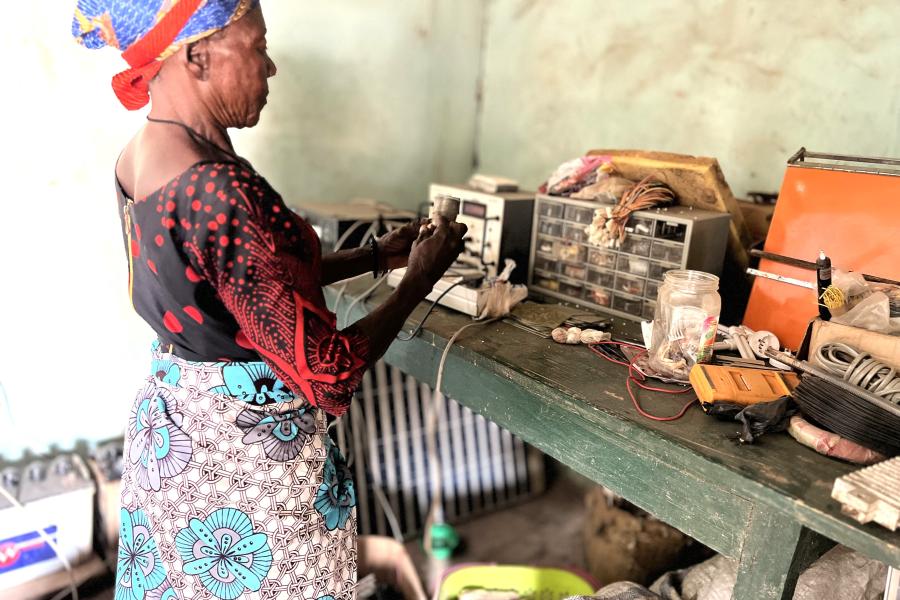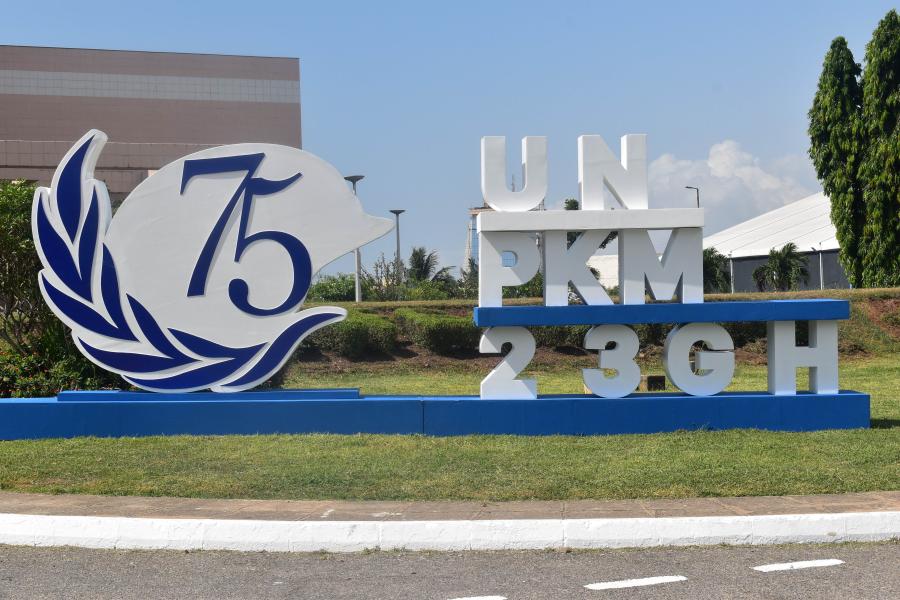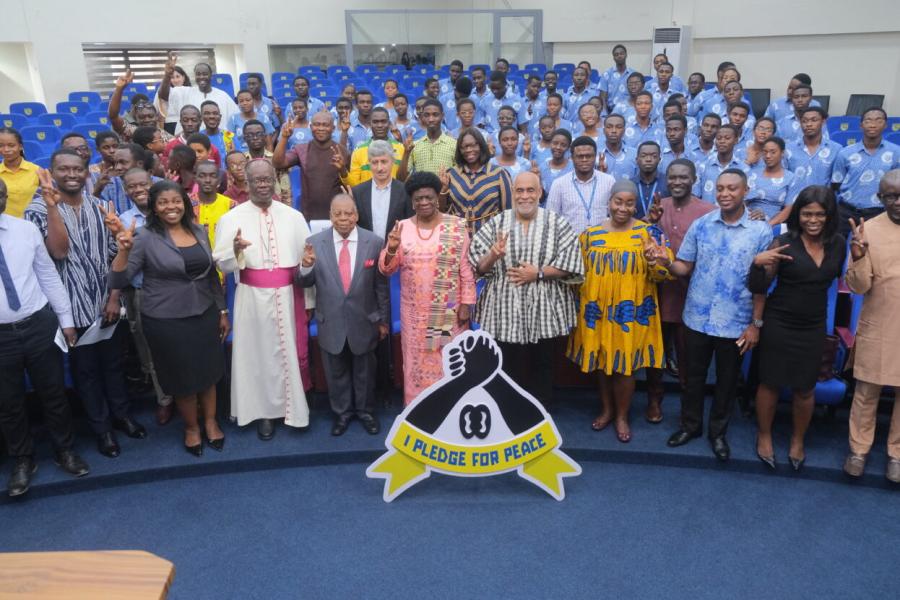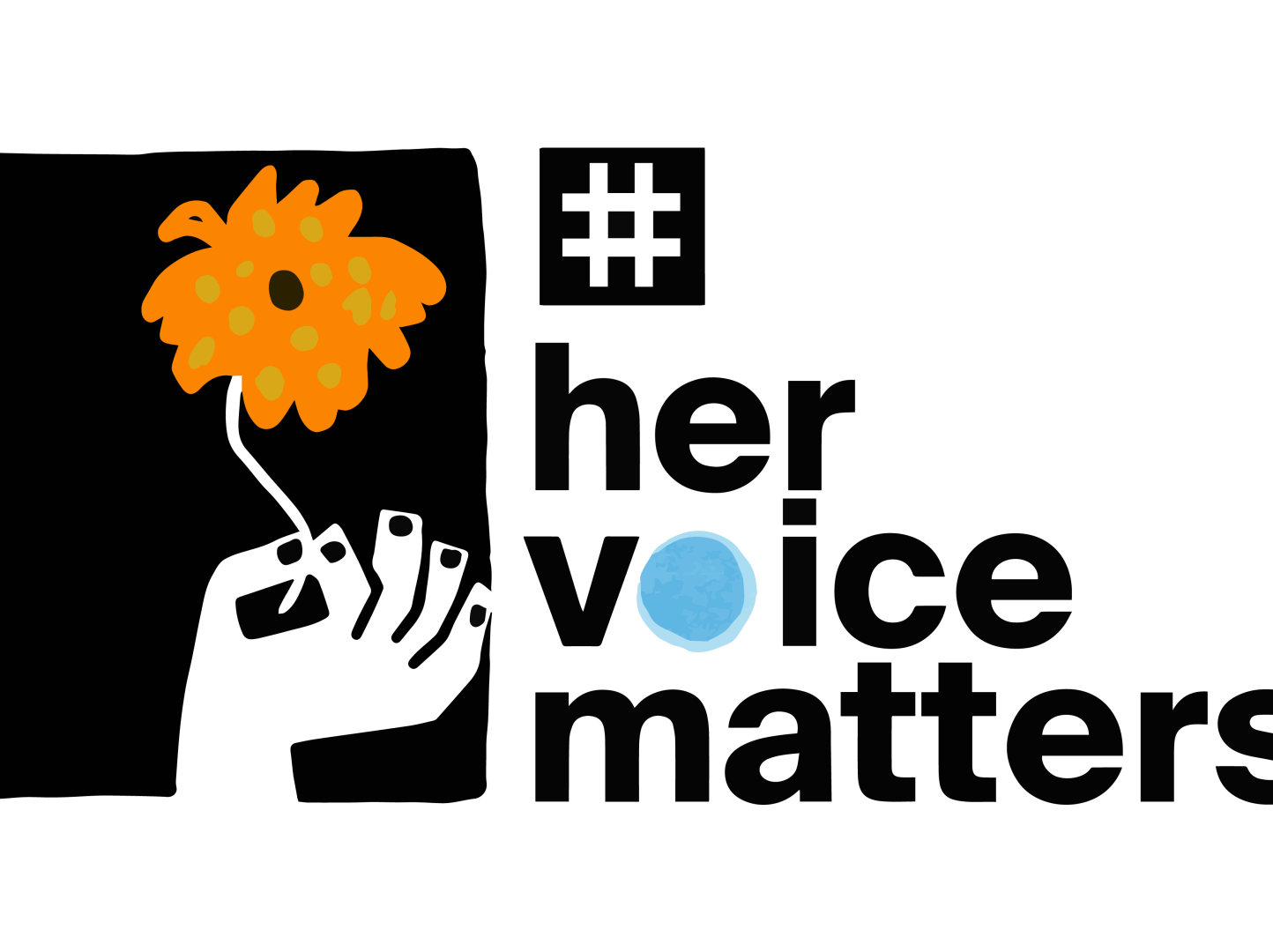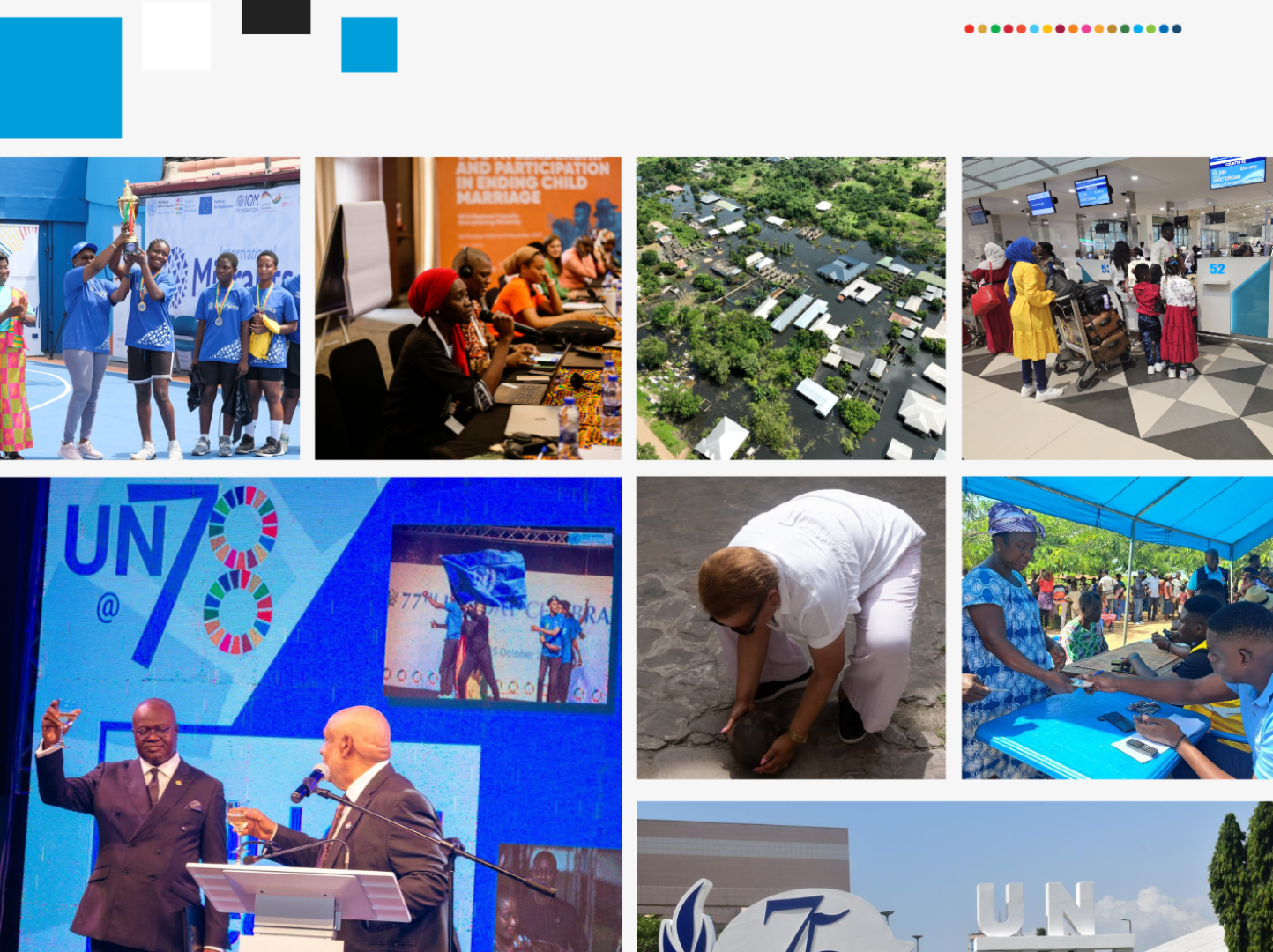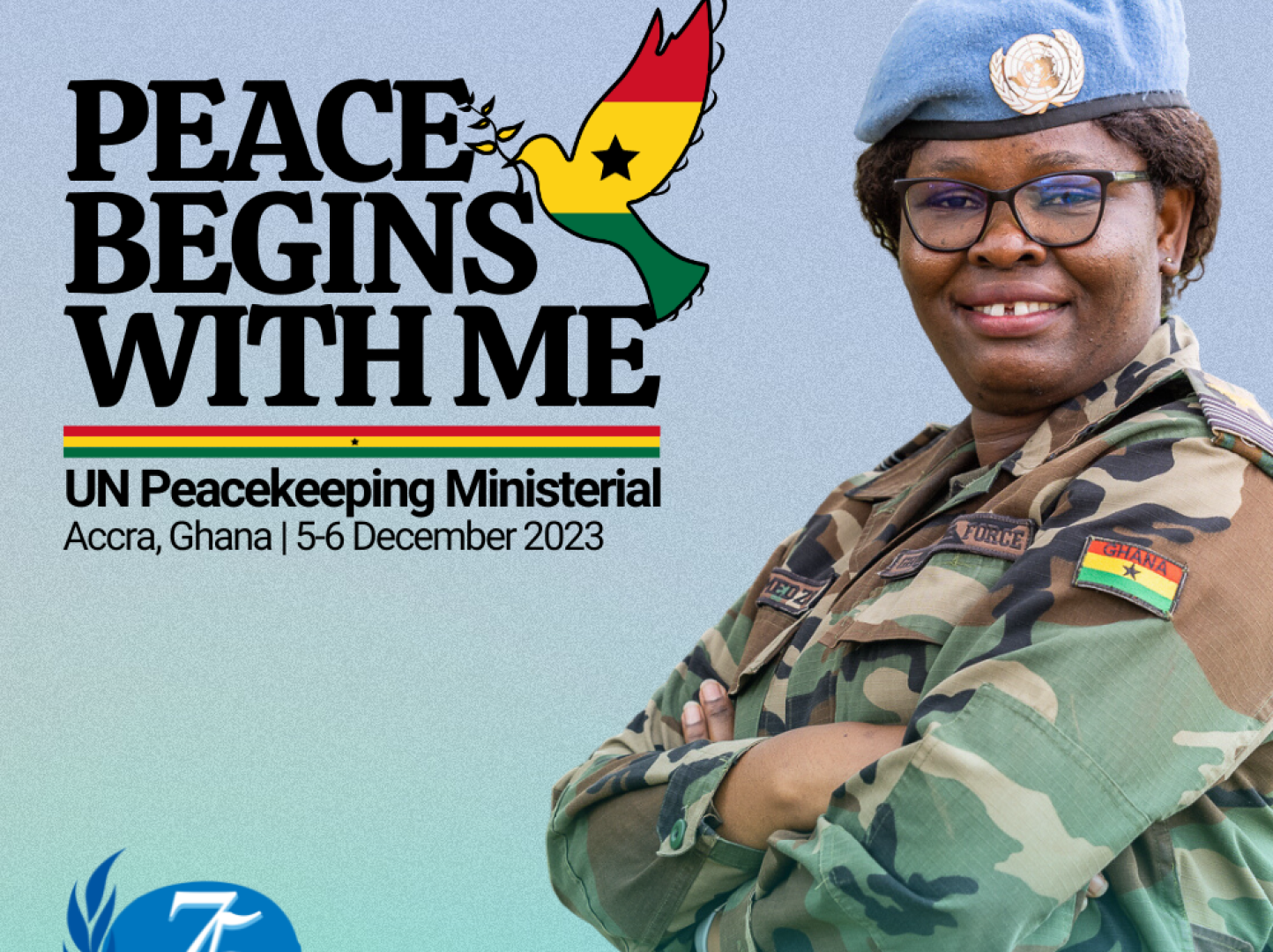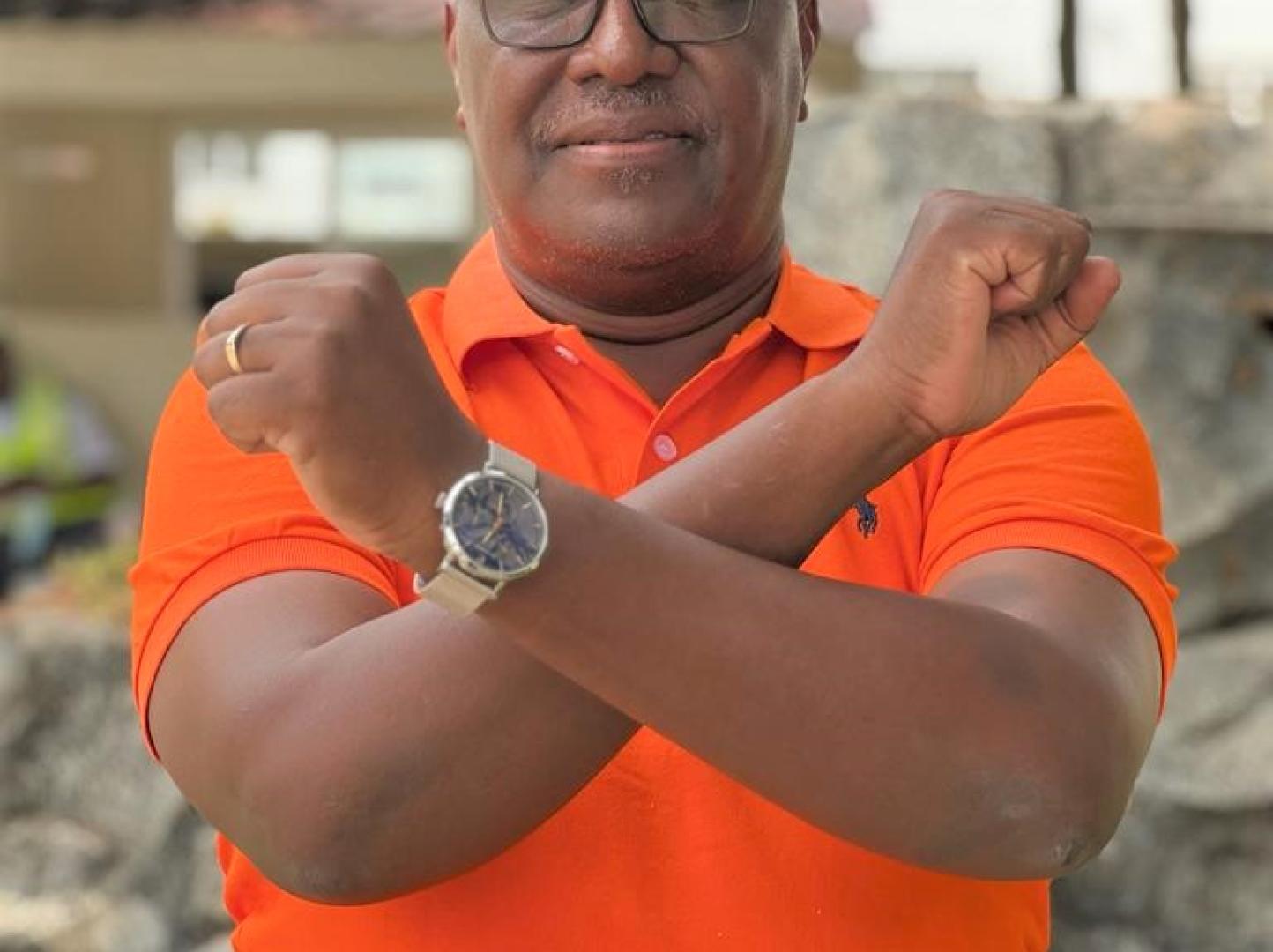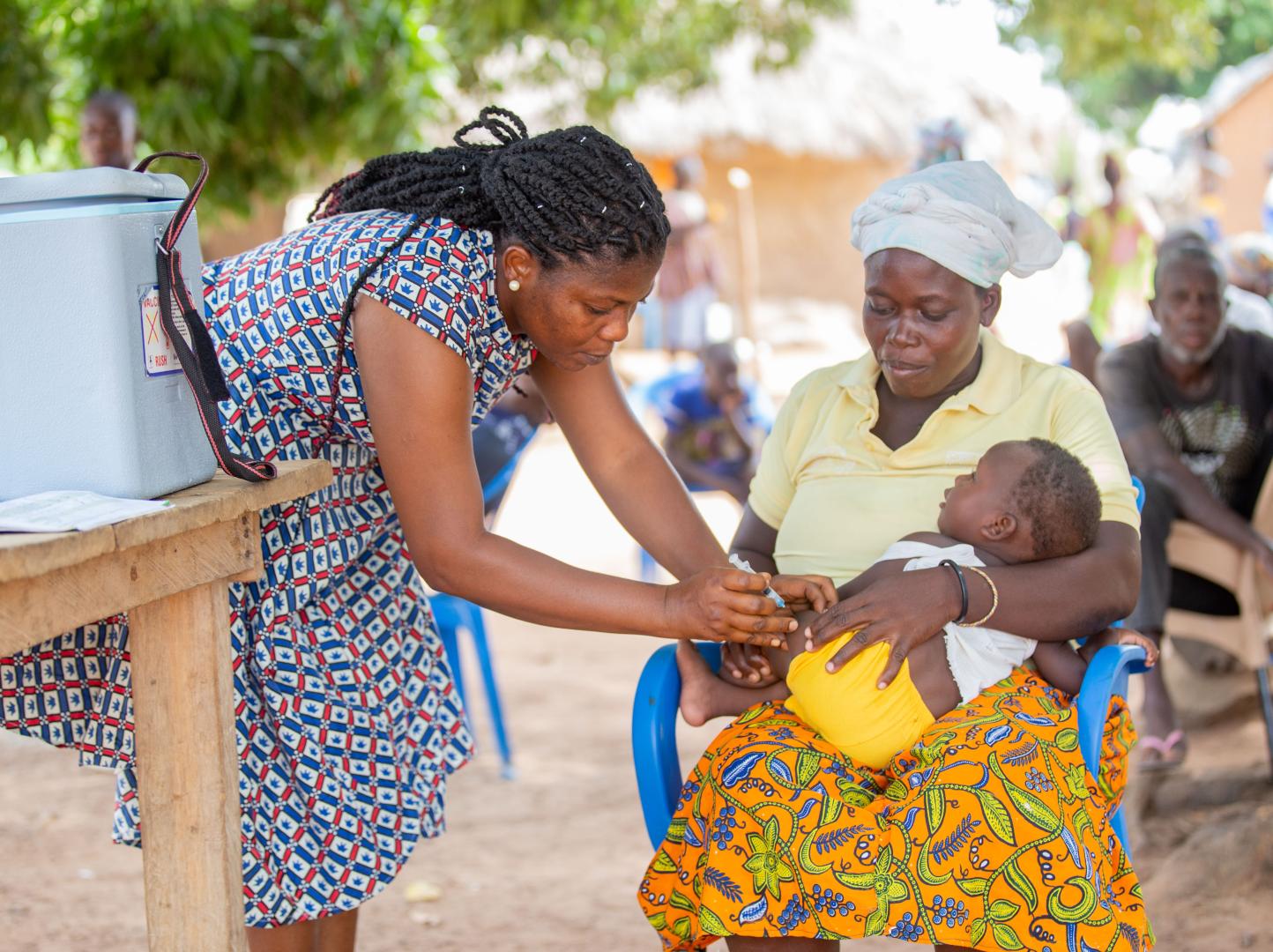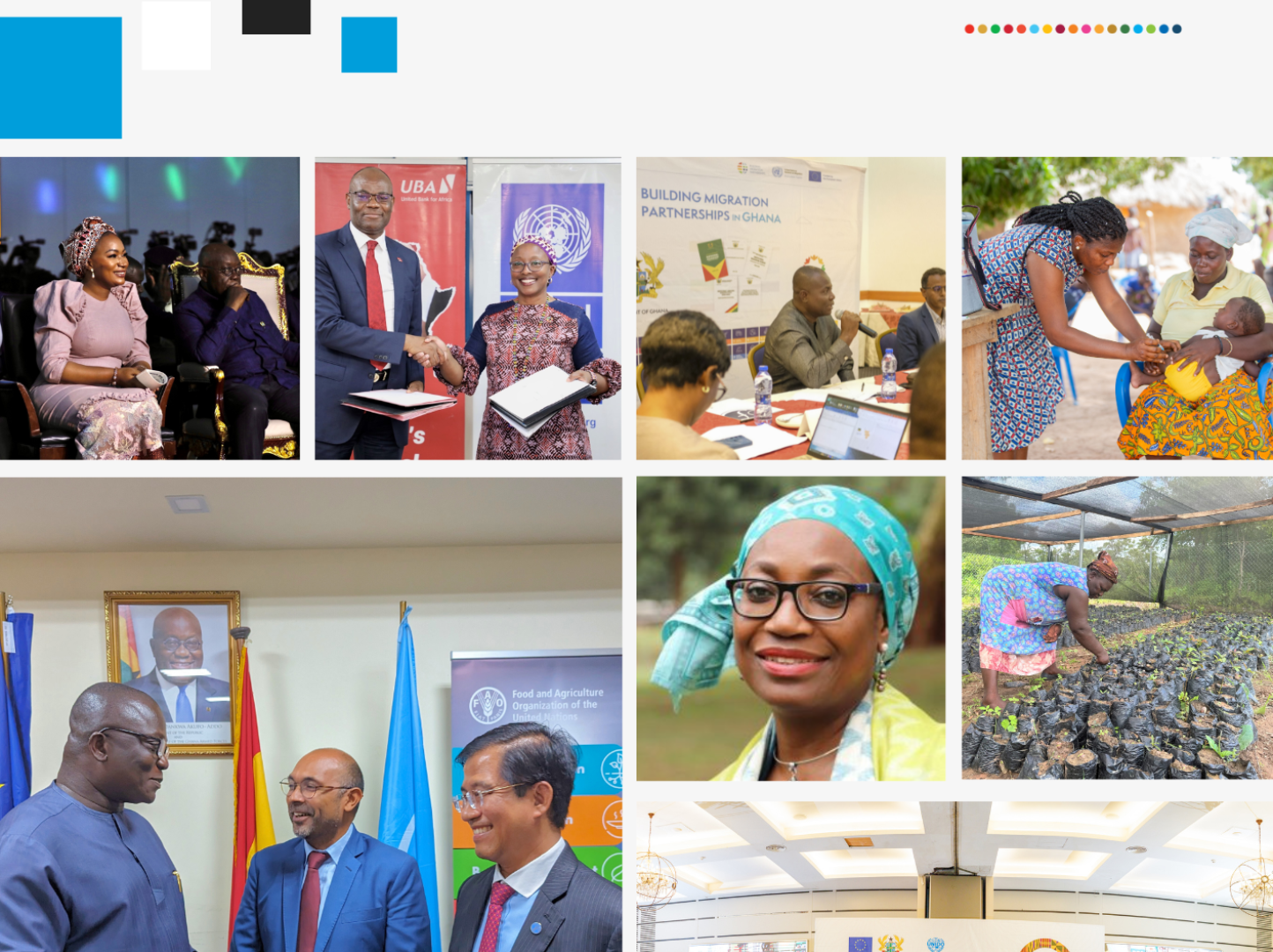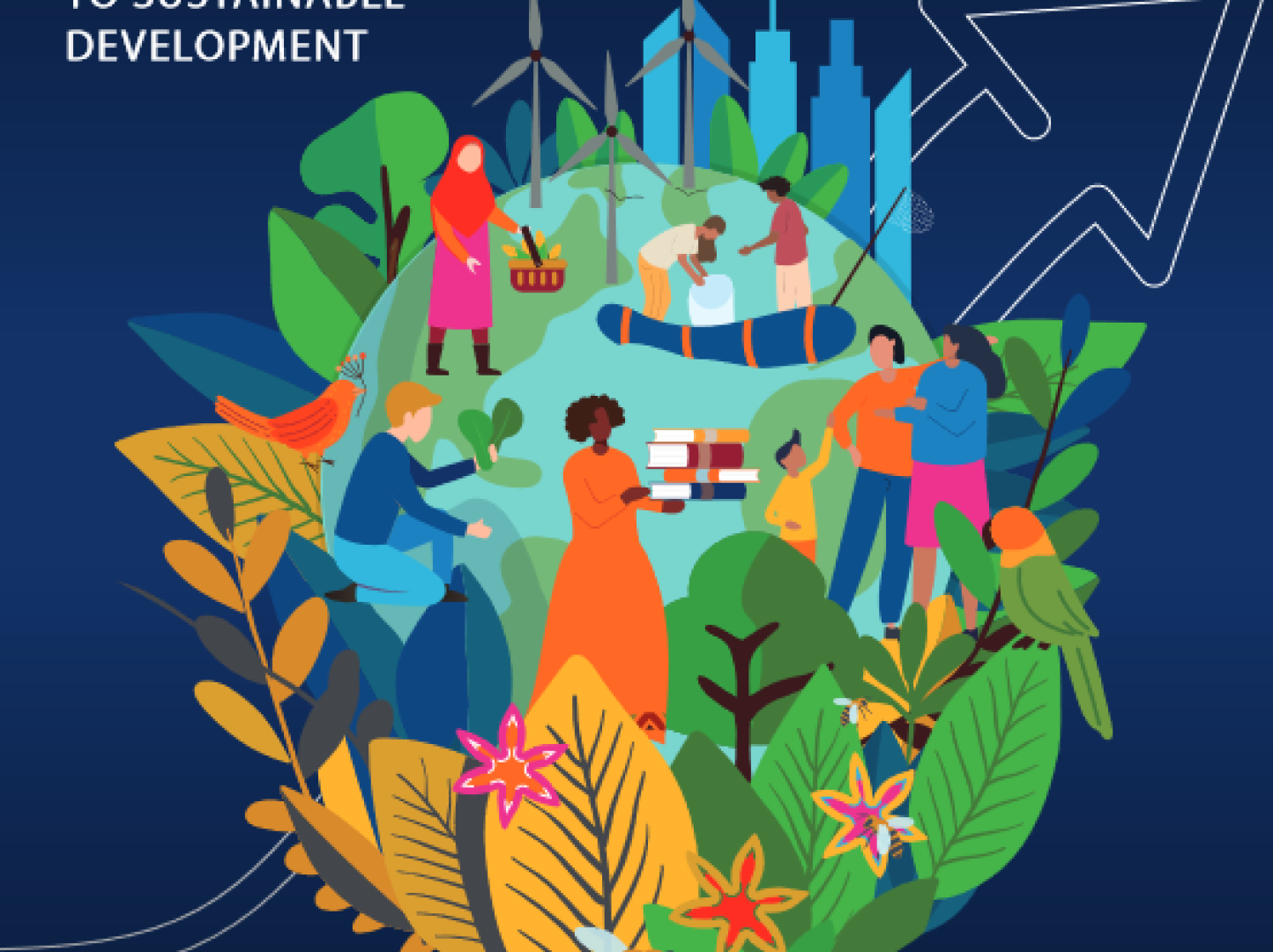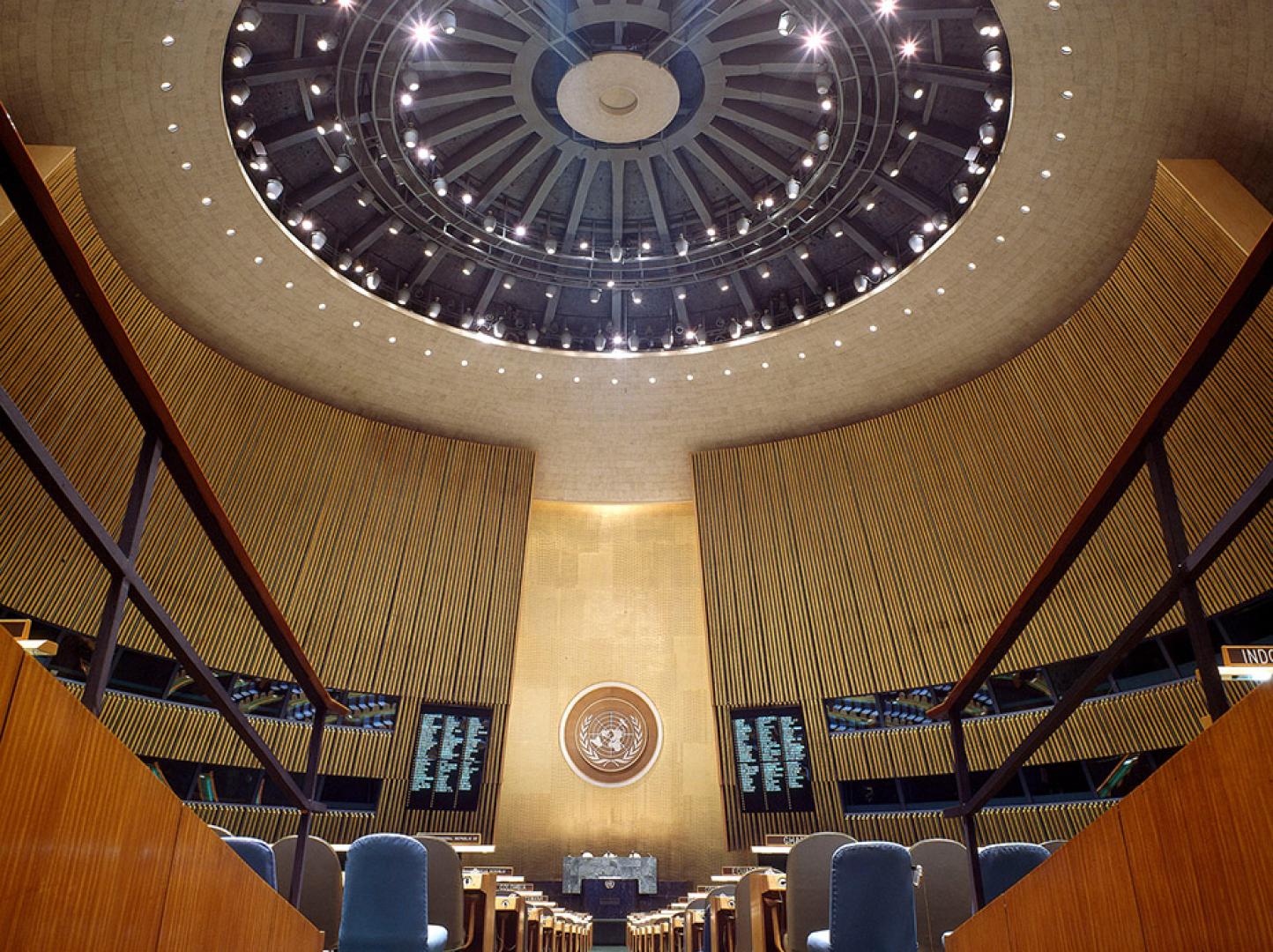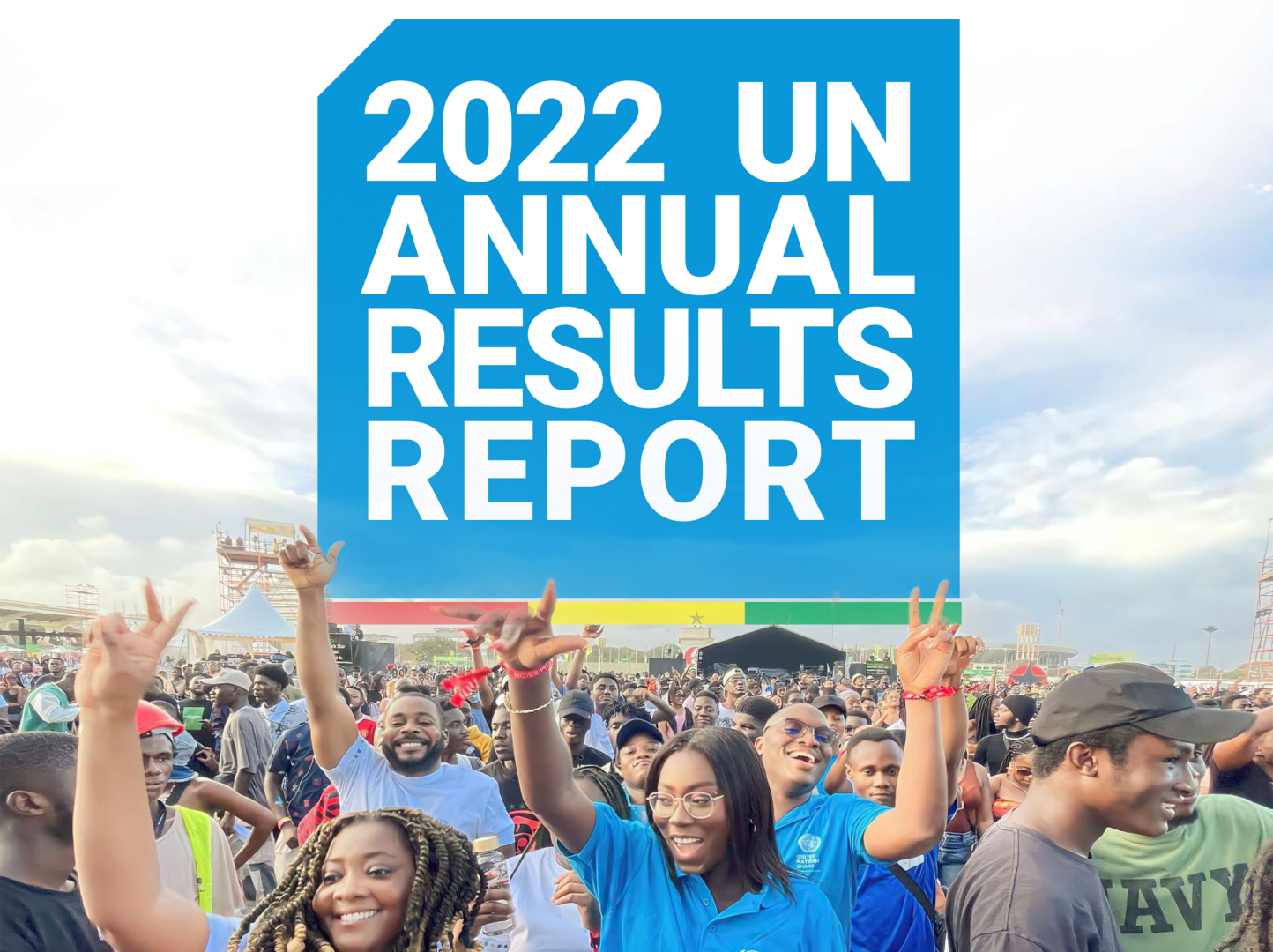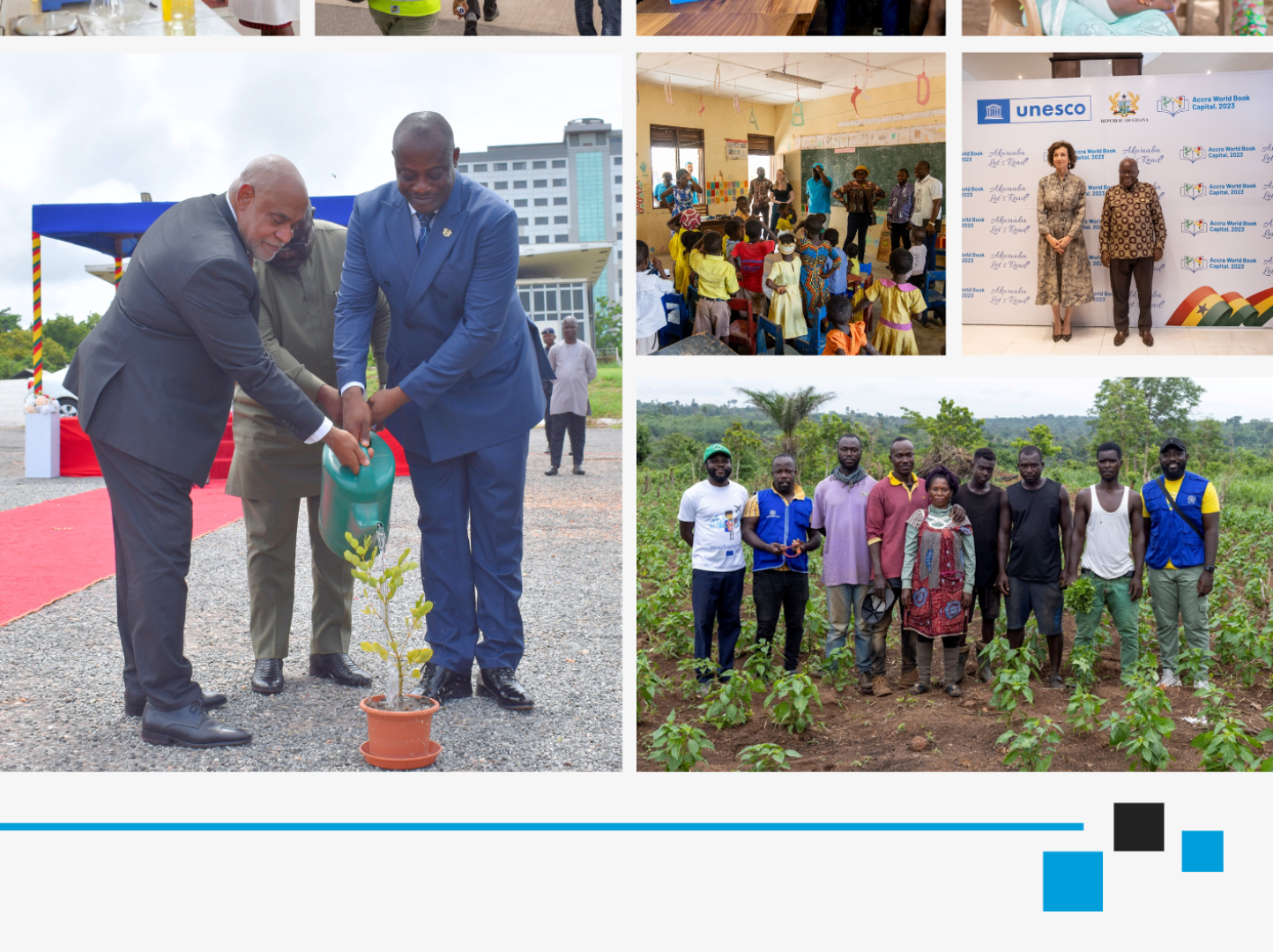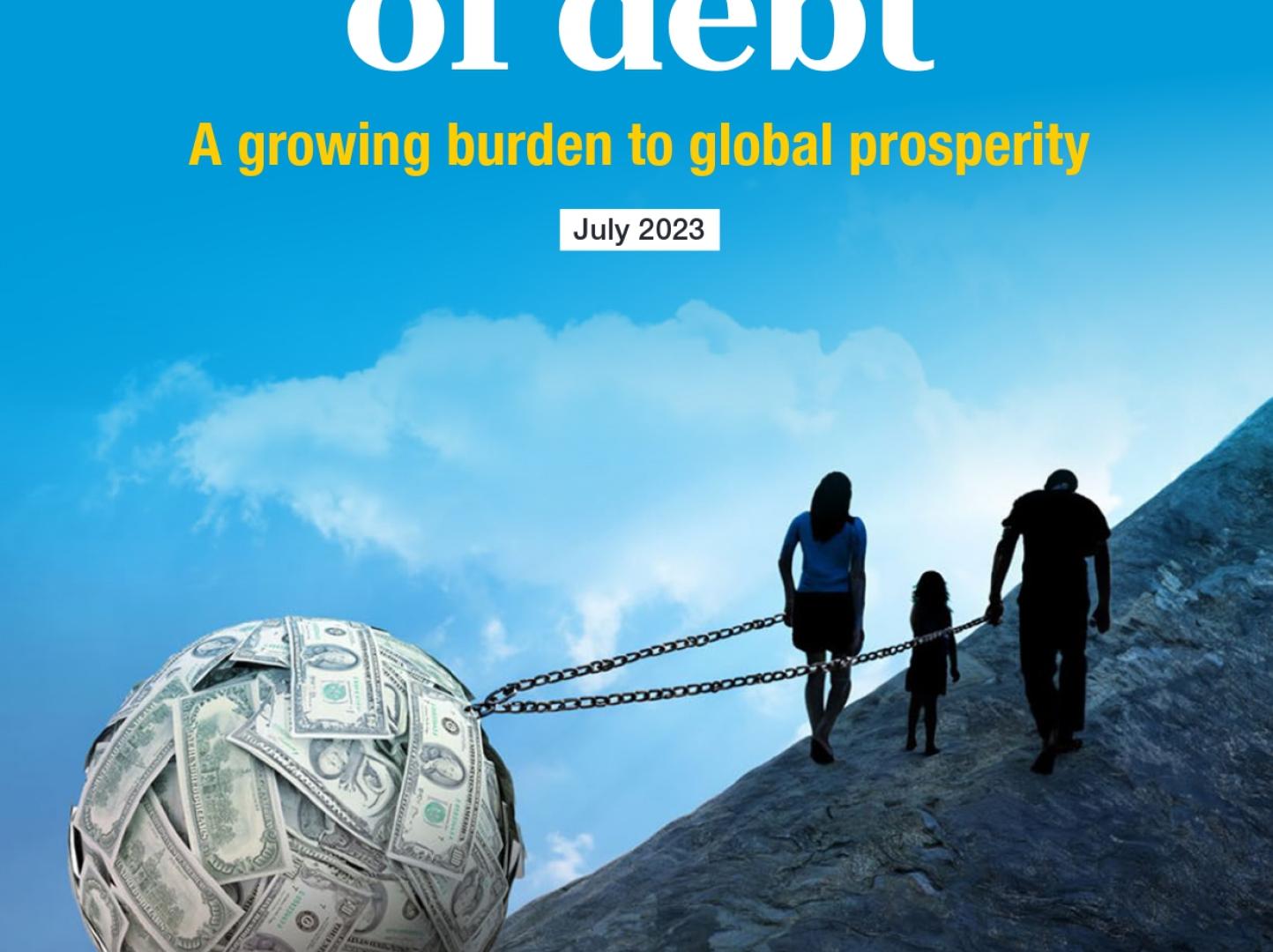Latest
Story
18 April 2024
UNESCO World Book Capital leaves a lasting legacy as Accra’s one-year tenure comes to an end
Learn more
Story
17 April 2024
Breaking Barriers: Advancing Diversity in Science, Technology, and Innovation
Learn more
Story
15 April 2024
Ghana launches the SALIENT project to combat armed violence and small arms trafficking
Learn more
Latest
The Sustainable Development Goals in Ghana
The Sustainable Development Goals are a global call to action to end poverty, protect the earth’s environment and climate, and ensure that people everywhere can enjoy peace and prosperity. These are the goals the UN is working on in Ghana:
Publication
13 August 2023
UN Ghana 2022 Annual Report
The report captures the UNCT’s collective achievements along the four results areas of the UNSDP꞉ shared prosperous economy; social investment in people; protected and safe environment, and; inclusive, accountable governance, along with the UNCT’s cross-cutting priorities.
The report reflects the work done by the UNCT in partnership with the Government and people of Ghana to help the country achieve the ambitious goals set in the Coordinated Programme of Economic and Social Development Policies (CPESDP), 2017–2024, as well as to help achieve the Sustainable Development Goals (SDGs) and the African Union’s (AU) 2063 Agenda. UN agencies, working jointly and leveraging their collective comparative advantage in various fields, have boosted Ghana’s resilience and drive towards further recovery from the impact of the COVID-19 pandemic, the knock-on effects of the war in Ukraine and climate challenges. For instance the UNCT helped advance Ghana’s agriculture and industrial sectors by supporting policy and capacity building initiatives leading to greater agricultural productivity, the adoption of climate-action and deforestation-free production strategies, and inclusive rural development. It enabled 5,000 smallholder farmers to use improved seed, thereby cutting post-harvest losses to less than 5%, and supported agricultural-sector players’ participation in the African Continental Free Trade Area (AfCFTA). The UNCT strengthened systems to deliver quality, sustainable, and transformative social services in health, education, nutrition and social protection sectors, which helped improve services and financing. It advocated the protection of social spending, supported the continuity of essential health services and improved access for underserved and vulnerable communities. This led to a sustained decline in disease-specific and child mortality. The UNCT supported the introduction of free technical and vocational education and training (TVET), which sharply increased TVET school enrolment from 13 000 in 2021 to 47 000, among others.
The report reflects the work done by the UNCT in partnership with the Government and people of Ghana to help the country achieve the ambitious goals set in the Coordinated Programme of Economic and Social Development Policies (CPESDP), 2017–2024, as well as to help achieve the Sustainable Development Goals (SDGs) and the African Union’s (AU) 2063 Agenda. UN agencies, working jointly and leveraging their collective comparative advantage in various fields, have boosted Ghana’s resilience and drive towards further recovery from the impact of the COVID-19 pandemic, the knock-on effects of the war in Ukraine and climate challenges. For instance the UNCT helped advance Ghana’s agriculture and industrial sectors by supporting policy and capacity building initiatives leading to greater agricultural productivity, the adoption of climate-action and deforestation-free production strategies, and inclusive rural development. It enabled 5,000 smallholder farmers to use improved seed, thereby cutting post-harvest losses to less than 5%, and supported agricultural-sector players’ participation in the African Continental Free Trade Area (AfCFTA). The UNCT strengthened systems to deliver quality, sustainable, and transformative social services in health, education, nutrition and social protection sectors, which helped improve services and financing. It advocated the protection of social spending, supported the continuity of essential health services and improved access for underserved and vulnerable communities. This led to a sustained decline in disease-specific and child mortality. The UNCT supported the introduction of free technical and vocational education and training (TVET), which sharply increased TVET school enrolment from 13 000 in 2021 to 47 000, among others.
1 of 3
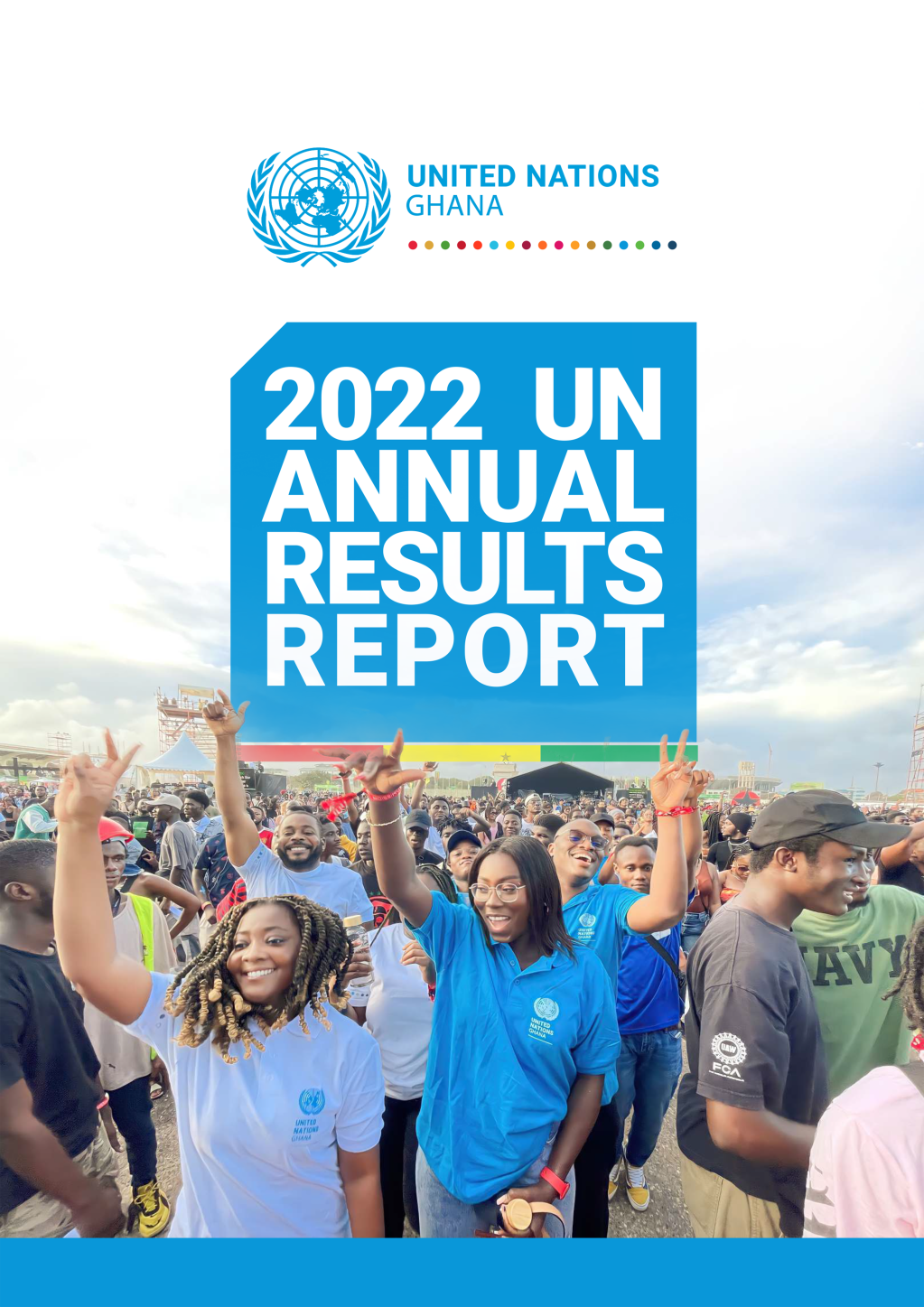
Publication
23 October 2023
UN Ghana Newsletter - October 2023
In this edition of the UN in Ghana Quarterly newsletter, UN Ghana harnesses engagement opportunities to support Ghana achieve the SDGs, United Bank for Africa (UBA) supports UN Ghana to boost inclusive and greenentrepreneurship in Ghana, UN forges partnership with the Government to boost child nutrition, launch of new EU-funded project to boost food security in northern Ghana and many more.
1 of 3
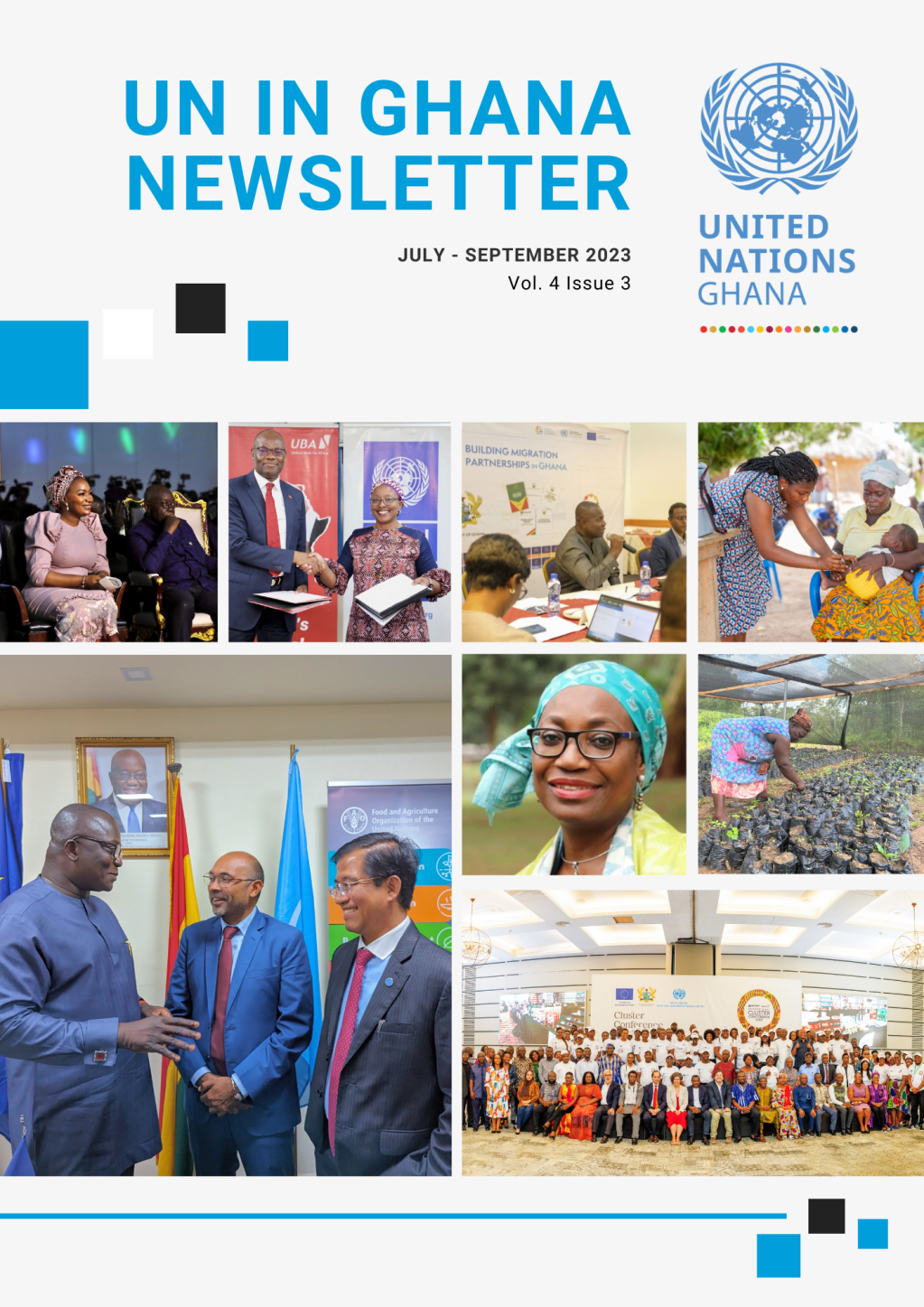
Publication
24 October 2023
Celebrating the United Nations at 78 – Accelerating action towards the SDGs
When the penholders of its founding document signed the Charter that birthed the United Nations some 78 years ago in 1945, they imagined a world of peace, prosperity, progress and development; a world where the rights of all people are entitled to them, without discrimination; a world where the benefits of our collective efforts are evenly shared. Their imagination is far from reality today.
Over the course of nearly eight decades of its journey, the United Nations has indeed faced and continues to address a wide range of challenges. These challenges include issues of international conflict, humanitarian crises, environmental issues, social and economic development. According to the UN Secretary-General, António Guterres, the challenges we face are universal and they “require universal solutions and cannot be solved through small groupings of states or coalitions of the willing.” As the only forum where this can happen, the United Nations continues to engage Member States to take action to ensure peace, freedom, development, equality and human rights throughout the world for the good of its peoples. These basic principles on which the UN was established still hold true today, as they did years back.
Regrettably, we are far from realizing the vision of the founders of the UN. Our world continues to grappleT with a wide range of crises and challenges that have profound impacts on societies, economies, and the global order. The COVID-19 pandemic, ongoing conflicts and climate change continue to create a web of challenges with significant global ramifications. Coupled with inequalities and injustices, these watersheds are giving rise to new grievances and a deep sense of unease among nations and people.
Halfway to the deadline for the 2030 Agenda, the SDG Progress report reveals we are leaving more than half the world behind; and have stalled or gone into reverse on more than 30 percent of the SDGs. It shows the number of people living in extreme poverty is higher than it was four years ago. Hunger has also increased and is now back at 2005 levels, and gender equality seems to be some 300 years away. With current trendsit is estimated that, only 30 percent of all countries will achieve SDG 1 on poverty by 2030. Simultaneously, inequalities are at a record high, and growing.
Transforming the Sustainable Development Goals into a tangible reality for people worldwide, the UN will hold the Summit of the Future in September 2024, a high-level event that will bring world leaders together to forge a new international consensus on how we deliver a better present and safeguard the future. To provide more detail on certain proposals contained in the Secretary-General’s vision for the future of international cooperation (Our Common Agenda) and to support world leaders in their deliberations as they prepare for the Summit of the Future, the UN Secretary-General has issued 11 policy briefs. The briefs cover areas including youth, digital compact, international financial architecture, information integrity on digital platforms, education, and peace.
In Ghana, the UN continues to support the country’s participation in many of these engagements. This past April, the UN Sustainable Development Cooperation Framework, its partnership agreement with the Government and people of Ghana, was signed. This partnership agreement demonstrates the UN in Ghana’s collective contributions to the country’s development process. The 3-year partnership focuses on Economic Transformation, Access to equitable social services and Durable peace and security in Ghana and in the sub-region, with climate action, data, digitalization, human rights and gender as cross-cutting issues. The UN will spend some 500 million dollars over the period of the Cooperation Framework to provide support that is catalytic and transformative to enable Ghana to realise its development goals.
This year, the UN has put its best foot forward, determined to influence critical thinking and policy decisions in areas that are vital and aligned to the Government priorities and the Cooperation Framework. By exploring unique engagement opportunities and collaborating with key partners, both new and old, the UN continues to leverage its collective thought leadership to stimulate discussions around some critical areas, including climate action, resource mobilization, innovative financing solutions for Small and Medium-Scale Enterprises, digitalization and human rights.
The UN’s support to Ghana’s engagement in the SDGs Summit recently, engagement with civil society and the private sector on food systems, as well as its support to actors towards their participation in the African Climate Summit this year, ahead of COP28 later this year, are but a few of the catalytical and transformative support to the Government.
The UN has further provided financial resources and technical support to catalyze institutional strengthening efforts and capacity enhancement of state institutions across various sectors. It has supported the productive capacity of MSMEs and value chain development through capacity building and access to finance as well as various digital initiatives.
Support for the social sector to enhance basic services including support for the review of the inclusive education policy, development of Ghana’s first Food-based Dietary Guidelines (FBDGs) and ongoing work to expand social protection social coverage are notable.
On sustaining peace, the UN is working assiduously with stakeholders to safeguard Ghana's peace through a 3-million US Dollar Peacebuilding fund programme to support women and youth empowerment and engagement in peacebuilding in Northern Ghana. Additionally, through the ‘I Pledge for Peace Campaign’, which was launched recently, and election round tables initiatives, the UN is supporting the work of the National Peace Council ahead of the 2024 elections to secure stakeholder commitments to preserve the peace of the country.
As we mark #UN78, we must bring a new urgency to national efforts, and a shared sense of common purpose to drive the positive change that we all want to see. The UN extends its heartfelt congratulations to Ghana on her leadership role at the United Nations.
1 of 3
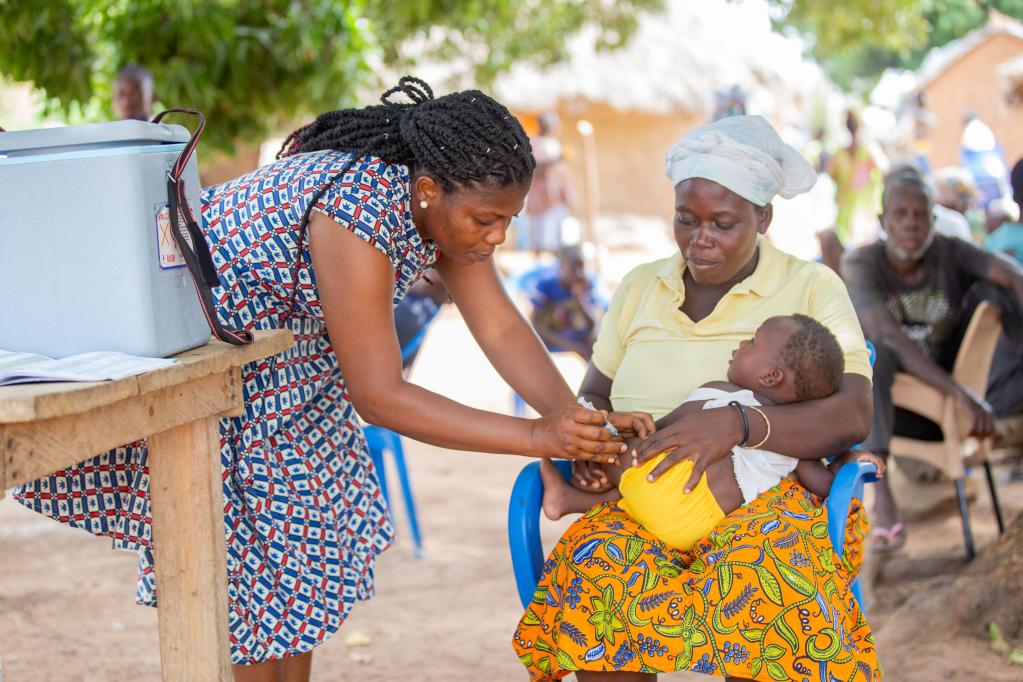
Story
18 April 2024
UNESCO World Book Capital leaves a lasting legacy as Accra’s one-year tenure comes to an end
Accra, the vibrant capital city of Ghana, oozed with celebrations of literary culture after being honoured as the UNESCO World Book Capital for 2023. These series of transformative activities left an indelible mark on Ghanaians.The year-long events sought to touch the lives of over 100,000 individuals, including children, youth, and adults. Mobile libraries reached remote corners, while schools and community learning centres were fortified with the tools of lifelong learning.One such event was the electrifying debate competition, where Akoto Lante Basic School emerged as the winner amidst stiff competition from 32 participating schools. The final showdown, held during the closing ceremony of Accra World Book Capital, encapsulated the spirit of learning that defined Accra’s tenure as the World Book Capital.In an exclusive interview, Ghana’s Ambassador to France, and Portugal, and Permanent Delegate to UNESCO, Ambassador Anna Bossman expressed her elation at the program's profound impact, suggesting that the actual reach might exceed the initial estimates. “They went down to the markets to see the kayayes (head porters), you know, so I think it probably… it may be more than 100,000” she said beaming with excitement.Addressing the audience at the closing ceremony, Ambassador Bossman said the activities carried out “laid a strong foundation for Ghana which will serve as a springboard for activities earmarked for the 2024 African Union Year of Education”. “Being designated as World Book Capital 2023 by UNESCO has enabled Accra, and more broadly Ghana, to gain visibility across the globe for its efforts to improve the lives of its citizens through the power of books and reading” shared the Resident Representative of UNFPA, Dr. Wilfred Ochan in a statement presented on behalf of UNESCO. “The impact of the program could be felt by marginalized groups, including women, youth, migrants, street children, and persons with disabilities … mobile libraries have crisscrossed neighbourhoods, bringing the magic of books to doorsteps. Workshops in various Ghanaian languages have nurtured budding writers and poets. Skills and training centres have empowered unemployed youth, equipping them with tools for a brighter tomorrow” he added.The Presidential Coordinator for Zongo and Inter-cities Secretariat, Mr. Ben Abdallah Banda, in a keynote address read on behalf of the Second Lady of the Republic of Ghana, H.E Samira Bawumia, said “Distributing over 10,000 books through programs like the Books-to-Go Projects and the African Story Box Project not only increased access to stories but ignited the passion for reading”. According to the Chief Director at the Ministry of Education, Mrs. Mamle Andrews the Ministry of Education, together with its partners undertook several reading promotion activities in 12 Municipalities in the Greater Accra Region and its environs attesting to the critical role of the book industry players, and third-party organizers in making the one-year a success shared the representative for the Hon. Minister of Education, The legacy of the Accra World Book Capital doesn't end with the closing ceremony. The Mayor of the Accra Metropolitan Assembly (AMA), Madam Elizabeth Naa Kwatsoe Tawiah Sackey, unveiled plans for a groundbreaking Accra World Book Capital Legacy Project for which AMA has earmarked a 5-acre land to elevate Accra's literary landscape for generations to come. “This project is expected to provide space for utilization by book writers, and other related professionals to promote writing, and reading”. As the chapter comes to a close, Ambassador Anna Bossman envisions a future where similar initiatives are replicated in cities across the country.
1 of 5
Story
17 April 2024
Breaking Barriers: Advancing Diversity in Science, Technology, and Innovation
The Disability Inclusive Hackathon (DI-Hack) is organised annually by Inclusive Tech Group to coincide with the annual celebration of the International Day of Persons with Disabilities (IDPD). During DI-Hack, participants, in groups of 10, with one member being a person with disability (PWD), collaborate to create a diverse range of assistive technology solutions that address the unique needs and challenges PWDs face in Ghana. This 3-day event is not just a competition but a platform that fosters creativity and social impact by leveraging technology to bridge gaps and create a more accessible world; solutions that are deeply rooted in the lived experiences of those they aim to benefit. The 2023 DI-Hack winning team, Hexohub, developed smart shoes that use Artificial Intelligence (AI) and cameras for path recognition, obstacle avoidance, and route learning for the visually impaired. They also proposed solutions such as smart spectacle and stick to aid mobility of the visually impaired; a gesture-based communication device to improve access to emergency assistance and to advance social inclusion for the deaf; a multimodal educational tool for children with autism; and an app that will help the visually impaired to independently access ATMs using their mobile phones. After each DI-Hack, the top three teams receive six-month mentorship to assist them develop their prototype designs into minimum viable products. According to Elisa Afia Matey, a participant of the DI-Hack 2023, the program is an enlightening and rewarding experience. She notes that, her team “Hexohub, created smart shoes and glasses to help people with vision problems (a challenge I personally understand) avoid obstacles.” She expressed the hope that such “programs will grow to make even more positive changes for everyone”Since 2022, UNESCO has supported the Inclusive Tech Group on this initiative to underscore the crucial message that science and technology should benefit everyone, and everyone, irrespective of their differences, should have the opportunity to contribute to and participate in these fields.
1 of 5
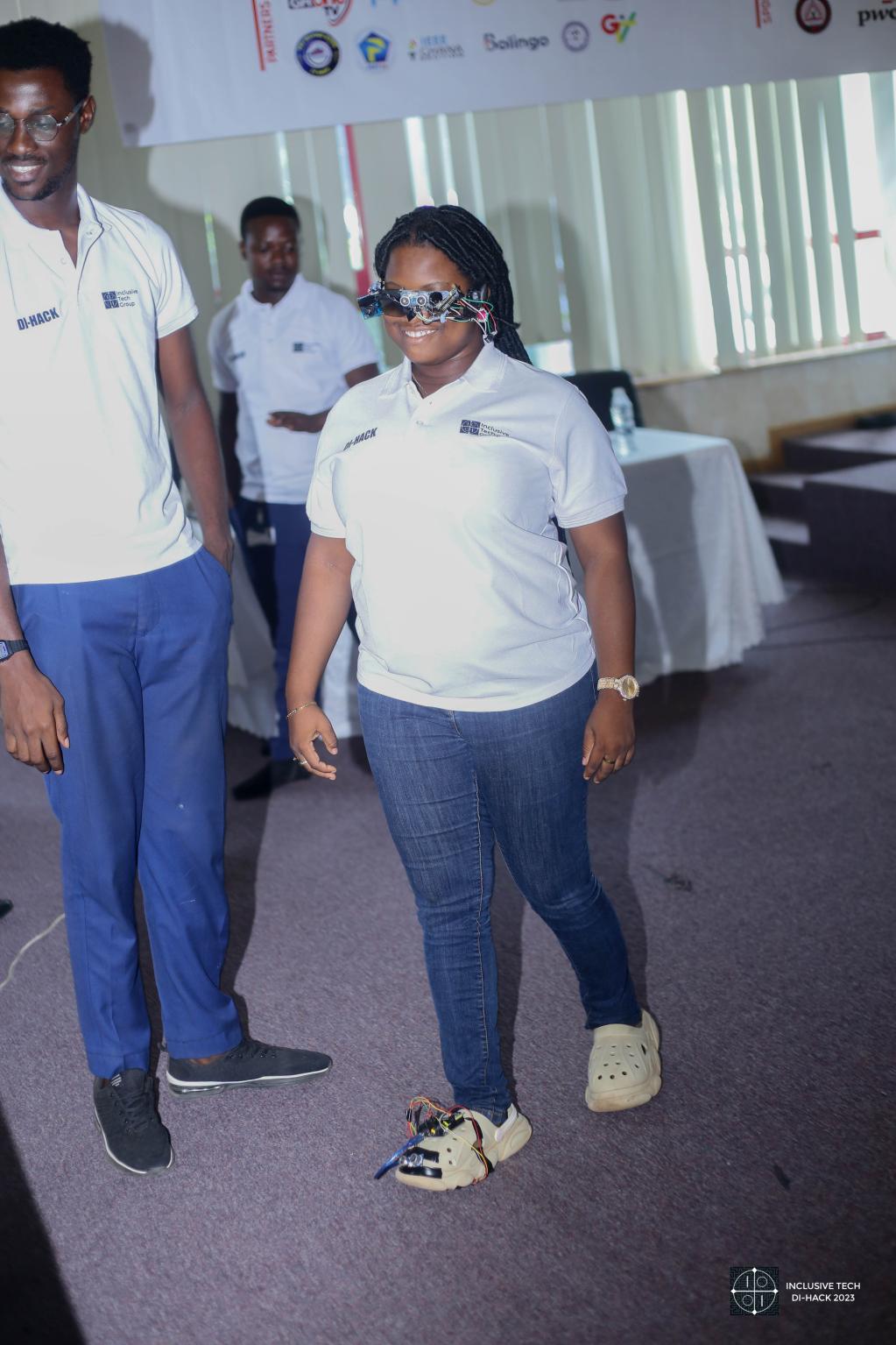
Story
15 April 2024
Ghana launches the SALIENT project to combat armed violence and small arms trafficking
This makes Ghana the third African country to benefit from the first phase of the SALIENT Trust fund. This joint initiative, spearheaded by the UN Office for Disarmament Affairs (UNODA) and the United Nations Development Programme (UNDP), aims to address armed violence and illicit small arms and light weapons trafficking, emphasizing a comprehensive approach to sustainable security and development.Speaking on the collaborative efforts of various UN agencies, including UNDP and the United Nations Office on Drugs and Crime (UNODC), in supporting the Ghanaian government and non-state actors such as the National Commission for Small Arms, the United Nations Resident Coordinator in Ghana, Mr. Charles Abani, highlighted the incorporation of small arms control into development frameworks as pivotal to the project's strategy. “Recent global developments underscore the urgent need to develop a robust strategy to safeguard sustainable development gains and address the menace of small arms proliferation. Efforts must focus on effective cross-border cooperation, capacity building, proper stockpile management, whole-of-country engagement, effective monitoring and accountability mechanisms and wider peacebuilding and governance issues to achieve lasting peace and security” he said.“The project will unfold over a 9-month timeline...the passage of the Small Arms Commission Bill into Law will provide the necessary tools and mechanisms to effectively regulate the possession and transfer of Small Arms and Light Weapons” stated the Board Chairman of the National Commission on Small Arms and Light Weapons, Rev. Prof. Paul Frimpong-Manso. Launching the project, the Director of the United Nations Regional Centre for Peace and Disarmament in Africa (UNREC), Mr Nahmtante Anselme Yabouri said the “SALIENT is part of a new global security approach focused on sustainable development and resilience in the face of growing armed violence orchestrated by armed groups, violent extremist or terrorist groups.” The Deputy Resident Representative of UNDP in Ghana, Mr. Sukhrob Khoshmukhamedov, commended all stakeholders for their collaboration in securing Ghana as a candidate for the SALIENT Project 2024. He stressed that UNDP would continue to support the National Commission on Small Arms and Light Weapons through various initiatives and indicated among others that the SALIENT project will focus on “supporting Civil Society Coalition on small arms and light weapons in Ghana coordinating non-state actors’ efforts in addressing [its] proliferation for sustainable peace and development in Ghana and the ECOWAS region”. In his closing remarks, the Country Representative of The United Nations Office on Drugs and Crime UNODC, Mr. Bernard Henebeng Asamoah, stressed the need to work together to help silence the guns.
1 of 5
Story
16 April 2024
UNESCO and UNIC partner to educate young students on slavery and the Trans-Atlantic Slave Trade
In a compelling collaboration aimed at enlightening young minds, the United Nations Information Centre (UNIC) in Accra teamed up with UNESCO, led by the Head of Office and Country Representative, Mr. Edmond Moukala N'Gouemo, to host an outreach event at the Ussher Fort to mark International Day of Remembrance of the Victims of the Slavery and the Transatlantic Slave Trade. Over 100 students from selected schools in Accra attended the event, organised by UNIC Accra. Observed annually on 25 March, this year’s observance was under the theme, "Creating Global Freedom: Countering Racism with Justice in Societies and Among Nations”.Mr. N'Gouemo shared insights from an African perspective, shedding light on the intellect and skills of enslaved ancestors. "Our forefathers were not just captured for their physical attributes," he emphasized, instilling a sense of pride in heritage among the students. Furthermore, he challenged students to be critical thinkers and use the lessons learnt from the briefing session to become change makers. The National Information Officer at UNIC Accra, Madam Cynthia Prah, echoed the object of the Day, urging students to eschew hatred, bigotry and discrimination. She engaged the students in thought-provoking discussions about the inhumane acts and unimaginable suffering endured by victims of the slavery and Transatlantic Slave Trade.For his part, the National Program Officer at UNESCO, Mr. Carl Ampah stressed on the importance of preserving world heritage sites like the Ussher Fort. He said it is important that we work to ensure that the stories of the past remain vivid and relevant for generations to come, adding that “UNESCO designates and helps people know the histories or the heritage of different kinds of people”. Through dramatic reenactments and immersive experiences, the students were transported back in time, gaining a deeper understanding of the horrors of slavery and the importance of countering racism with justice in societies and among nations. This collaborative effort between UNIC and UNESCO served to raise awareness about the horrors of slavery and foster a more inclusive and equitable world. Both students and teachers from the two participating schools, Bishop Mixed Junior High School and Mantse Tackie School, were thankful for the knowledge imparted on the students.
1 of 5
Story
19 March 2024
Advancing the Women, Peace and Security Agenda: UNIC Accra Hosts Successful Film Screening and Panel Discussion.
“Being a woman gave other women the opportunity to easily approach me” says Captain Esinam D. Baah, a Ghanaian soldier who once led her platoon for a year with the UN Interim Force in Lebanon. Capt. Baah was sharing her peacekeeping experience on a panel discussion on Women, Peace and Security (WPS) during an event in Accra, Ghana. In 2000, the UN Security Council passed Resolution 1325 (UNSCR 1325) on WPS in response to lessons learned on peacekeeping and peacebuilding. The Resolution called on countries to address the impacts that conflict had on women and girls around the world and to systematically include women in peacebuilding efforts, including peace talks, peacekeeping and post-conflict reconstruction efforts. The WPS agenda remains critically important today and thus strengthening the meaningful participation of women peacekeepers is a priority for UN peacekeeping, and it is an operational necessity.To highlight the importance of the the WPS agenda and advance women inclusion in peacekeeping, the Department of Peace Operations’ Strategic Communications Section through the United Nations Information Centre (UNIC) Accra held a highly impactful panel discussion and film screening in Accra dedicated to advancing the role of women in peace and security efforts.The event highlighted the success story of Ghana and national efforts at advancing this agenda. The five member panelist included Group Captain Theodora Agornyo, Ghana Armed Forces - Gender Policy Advisor Unit; Dr. Emma Birikorang, Deputy Director, Faculty of Academic Affairs and Research at the Kofi Annan International Peacekeeping Training Centre (KAIPTC)-Women Peace Security Institute; Bertha Desmennu, Snr. Liaison Officer for Canada’s Elsie Initiative Bilateral Partnership Ghana; Afua Ansre, Snr. Gender Advisor, UN Women; and Captain Esinam D. Baah of the Ghana Armed Forces. They delved deeper into the theme for the event, “Women, Peace, and Security & Gender-responsive Leadership” with a resonating call for more qualified women to receive leadership roles. Delivering his opening statement, the the UN Resident Coordinator, Charles Abani noted that it is increasingly clear that sustainable peace cannot be achieved without the full and meaningful participation of women at all levels of decision-making, especially as conflicts persist and new challenges emerge. “Throughout history, women have been agents of change, resilience, and hope in the face of adversity. Their contributions to conflict resolution, peacebuilding, and community empowerment are undeniable. It's time to amplify their voices, recognize their agency, and ensure their meaningful participation in decision-making processes at all levels” he said. The keynote address was delivered by the former Deputy Force Commander of the United Nations Mission for the Referendum in Western Sahara (MINURSO), Commodore Faustina Boakyewaa Anokye. She said the journey in achieving gender equality had not been an easy one and more actions are needed to achieve gender parity. “We can and must do better because equality for women is progress for all. Let us embrace equity and invest in women for accelerated growth”. She urged the women in various security services to challenge themselves and take up the mantle in holding various positions wherever they find themselves. Speaking to the Elsie initiative, Bertha Desmennu said “the initiative is just not looking at women in numbers but rather women participating in all ranks, taking up all roles and not being limited to what historically has been recognized as gender based”."We are thrilled with the success of this event and the meaningful conversations it sparked," said the head of UNIC , Accra, Cynthia Prah. "It was inspiring to see the enthusiasm and commitment of all participants sharing their thought and experiences towards advancing the WPS agenda."Two videos recounting the journey of Captain Baah, before and during her deployment and return home, and Ghana’s efforts at enhancing women's involvement in peacekeeping missions were screened. The audience engaged actively as they asked questions, fostering an atmosphere of curiosity, knowledge sharing and inspiration. The success of the event underscores the UN’s commitment to promoting awareness and understanding the WPS agenda and encouraging women inclusion in peacekeeping.
1 of 5
Press Release
15 April 2024
United Nations in Ghana and key partners set to roll out "I Pledge for Peace Campaign" in Ghana ahead of 2024 elections.
The campaign, initially launched to coincide with the 2023 International Day of Peace, will actively engage a diverse range of stakeholders, including individuals, communities, civil society organizations, government entities, religious leaders, and youth groups. The overarching goal is to foster a culture of peace, advocate for peaceful elections, and promote tolerance and peaceful co-existence before, during, and after the electoral process.
"Elections represent a key moment for citizens to use their voting power to reflect, choose, and select leaders to act for their country and the future. This can only be possible when there is peace and stability, freedom, tolerance, and respect for one another. Elections are not a period of combat and the unhealthy exchange of views or for divisive language" says the UN Resident Coordinator in Ghana, Mr. Charles Abani. “We want to use this campaign to urge stakeholders to publicly commit to peace, and by extension, a peaceful election. We believe that the positive actions of stakeholders, through social media and other channels, will encourage tolerance and discourage misinformation.” He further notes.
The campaign encourages individuals and organizations to make public pledges for peace, amplifying the message through various communication channels, including social media. The aim is to create a collective commitment to a peaceful electoral environment. These pledges will be shared on all the UN in Ghana and National Peace Council social media platforms.
The Chairman of the National Peace Council, Rev. Dr. Ernest Adu-Gyamfi, underscores the importance of individual contributions to achieving peace. "Until every life is respected, and properties protected, achieving peaceful co-existence remains a distant goal. We all, as individuals, need to spread messages that encourage peace because its very existence begins with us, for all we have is one Ghana. The National Peace Council will do everything in its power to support this campaign and ensure a peaceful election come December 2024."
The "I Pledge for Peace Campaign" reflects a collaborative effort between the United Nations, the National Peace Council, and various stakeholders to create a peaceful and inclusive electoral process in Ghana.
Ghana’s democracy remains a beacon of hope for the continent. The UN continues to support the country to foster its development agenda in a peaceful atmosphere and uphold its reputation as a regional pacesetter for democratic governance. Join the UN Team in Ghana and key stakeholders and PLEDGE FOR PEACE.
For media inquiries, please contact:
Faith Junko Edison, Head of Public Relations, National Peace Council - Junkogawa.isd@gmail.com
Cynthia Prah, National Information Officer, United Nations Information Centre (UNIC) - prah@un.org
"Elections represent a key moment for citizens to use their voting power to reflect, choose, and select leaders to act for their country and the future. This can only be possible when there is peace and stability, freedom, tolerance, and respect for one another. Elections are not a period of combat and the unhealthy exchange of views or for divisive language" says the UN Resident Coordinator in Ghana, Mr. Charles Abani. “We want to use this campaign to urge stakeholders to publicly commit to peace, and by extension, a peaceful election. We believe that the positive actions of stakeholders, through social media and other channels, will encourage tolerance and discourage misinformation.” He further notes.
The campaign encourages individuals and organizations to make public pledges for peace, amplifying the message through various communication channels, including social media. The aim is to create a collective commitment to a peaceful electoral environment. These pledges will be shared on all the UN in Ghana and National Peace Council social media platforms.
The Chairman of the National Peace Council, Rev. Dr. Ernest Adu-Gyamfi, underscores the importance of individual contributions to achieving peace. "Until every life is respected, and properties protected, achieving peaceful co-existence remains a distant goal. We all, as individuals, need to spread messages that encourage peace because its very existence begins with us, for all we have is one Ghana. The National Peace Council will do everything in its power to support this campaign and ensure a peaceful election come December 2024."
The "I Pledge for Peace Campaign" reflects a collaborative effort between the United Nations, the National Peace Council, and various stakeholders to create a peaceful and inclusive electoral process in Ghana.
Ghana’s democracy remains a beacon of hope for the continent. The UN continues to support the country to foster its development agenda in a peaceful atmosphere and uphold its reputation as a regional pacesetter for democratic governance. Join the UN Team in Ghana and key stakeholders and PLEDGE FOR PEACE.
For media inquiries, please contact:
Faith Junko Edison, Head of Public Relations, National Peace Council - Junkogawa.isd@gmail.com
Cynthia Prah, National Information Officer, United Nations Information Centre (UNIC) - prah@un.org
1 of 5
Press Release
28 February 2024
UNAIDS Executive Director Winnie Byanyima responds to the passage of the Human Sexual Rights and Ghanaian Family Values Bill in Ghana’s parliament
If the bill does become a law, it will affect everyone. Ghana is respected as a stable country where the rule of law prevails, a member of the Human Rights Council, and a global leader in fighting inequality. African values and principles of Ubuntu, dignity, non-discrimination, equality, empathy, protection from violence and care for each other shaped Ghana’s independence struggles, and have continued to be at the heart of Ghana’s society and constitutional democracy. Approaches rooted in inclusion of all people have been crucial to Ghana’s progress in the HIV response. To achieve the goal of ending AIDS as a public health threat by 2030, it is vital to ensure that everyone has equal access to essential services without fear, stigma or discrimination, and that providers of life-saving HIV prevention, testing, treatment and care services are supported in their work. If Human Sexual rights and Ghanaian Family Values Bill becomes a law, it will exacerbate fear and hatred, could incite violence against fellow Ghanaian citizens, and will negatively impact on free speech, freedom of movement and freedom of association.If it becomes law, it will obstruct access to life-saving services, undercut social protection, and jeopardize Ghana’s development success.Evidence shows that punitive laws like this Bill are a barrier to ending AIDS, and ultimately undermine everyone’s health.”UNAIDS Executive Director Winnie Byanyima responds to the passage of the Human Sexual Rights and Ghanaian Family Values Bill in Ghana’s parliament | UNAIDS
1 of 5
Press Release
28 February 2024
Ghana: Türk alarmed as parliament passes deeply harmful anti-gay bill
“The bill broadens the scope of criminal sanctions against lesbian, gay, bisexual, transgender, transexual and queer people – simply for being who they are – and threatens criminal penalties against perceived allies of LGBTQ+ people,” said Türk.“I call for the bill not to become law. I urge the Ghanaian Government to take steps to ensure everyone can live free from violence, stigma and discrimination, regardless of their sexual orientation or gender identity. Consensual same-sex conduct should never be criminalized.”The High Commissioner also expressed deep alarm that the Bill criminalizes the legitimate work of human rights defenders, teachers, medical professionals, landlords, as well as people seeking healthcare, and unduly restricts freedom of association and expression of everyone in Ghana.“The bill is contrary to Ghana’s own Constitution and freely-undertaken regional and international human rights obligations and commitments – including to leave no one behind in the implementation of the 2030 Agenda for Sustainable Development,” said the High Commissioner.“Criminal sanctions for consensual same-sex conduct not only violate key international human rights norms and standards on equality, non-discrimination, privacy and equal protection of the law, among others – there is extensive evidence that they legitimize prejudice, expose people to hate crime, police abuse, harassment, intimidation, blackmail and torture. They also perpetuate discrimination and denial of access to basic services, including in healthcare, education and housing,” he added.Türk stressed that the bill is corrosive and will have a negative impact on society as a whole.He restated his Office’s commitment to work with the Government of Ghana and its national partners to ensure that Ghana fulfils its human rights commitments and obligations.Ghana: Türk alarmed as parliament passes deeply harmful anti-gay bill | OHCHR
1 of 5
Press Release
22 February 2024
APPLICATIONS INVITED FOR JOURNALISM FELLOWSHIPS AT UNITED NATIONS HEADQUARTERS
The fellowships are open to journalists who are native to the mainly developing countries in Africa, Asia, Latin America and the Caribbean, and Oceania and are currently working for media organizations. Applicants must demonstrate an interest in and commitment to international affairs and to conveying a better understanding of the U.N. to their readers and audiences. They must also have approval from their media organizations to spend up to three months in New York to report from the U.N. The program is not intended to provide basic skills training to journalists; all fellowship recipients must be media professionals.Journalists are selected each year after a review of all applications and given the incomparable opportunity to observe international diplomatic deliberations and to gain a broader perspective and understanding of matters of global concern. Many past fellowship recipients have achieved prominence in their professions and countries. Fellowship eligibility criteria and documentation requirements, as well as the fellowship application, can be found on the Fund’s web site at www.unjournalismfellowship.org. Questions about the program, eligibility and the application process can be directed by email to fellowship2024@unjournalismfellowship.org.Although the Fund is based at the U.N., it does not receive financial support from the world organization. The Fund was established as an independent entity by U.N. journalists over 60 years ago as a living memorial to the legacy of Secretary-General Dag Hammarskjöld. It continues to be operated by U.N. journalists and relies on financial support from U.N. Missions, foundations, organizations and individuals.
1 of 5
Press Release
14 February 2024
The Reham al-Farra Memorial Journalism Fellowship (RAF) Invites Applications for the 2024 Programme
Established in 1981, the RAF Fellowship has a rich history of empowering talented young journalists, having awarded 652 fellowships to journalists from 168 countries, including Ghana. Fellows selected for the programme gain unprecedented access to senior UN officials, exclusive interviews, briefings with UN experts, and training courses with renowned media institutions. They will have the opportunity to produce high-quality coverage of UNGA, High-Level and side events, and various issues related to the UN. They also benefit from networking opportunities with journalists from diverse backgrounds, leading to positive impacts on their careers and professional growth.
Deadline for applying is March 15, 2024. Interested journalists are encouraged to apply online at https://www.un.org/en/raf/application2024.
"This is indeed a great opportunity for Ghanaian journalists to gain first-hand insight into the work of the UN," said the National Information Officer of the UN Information Centre, Ms. Cynthia Prah. "By supporting and recognizing deserving journalists from our communities, we contribute to building their capacities, fostering greater awareness of global issues and strengthening partnerships with the media."
About the Reham al-Farra Memorial Journalism Fellowship (RAF):
The RAF Fellowship aims to enhance understanding of the UN's work and foster more accurate reporting on global issues among journalists worldwide. It receives broad support across the UN Secretariat, and senior UN officials featured in past RAF programmes include the Secretary-General, Deputy Secretary-General, President of the UNGA and SG Spokesperson, among others. For more information about the RAF Fellowship and application guidelines, please visit https://www.un.org/en/raf.
END
1 of 5
Latest Resources
1 / 11
Resources
05 February 2024
Resources
28 November 2023
Resources
24 October 2023
Resources
04 September 2023
1 / 11

